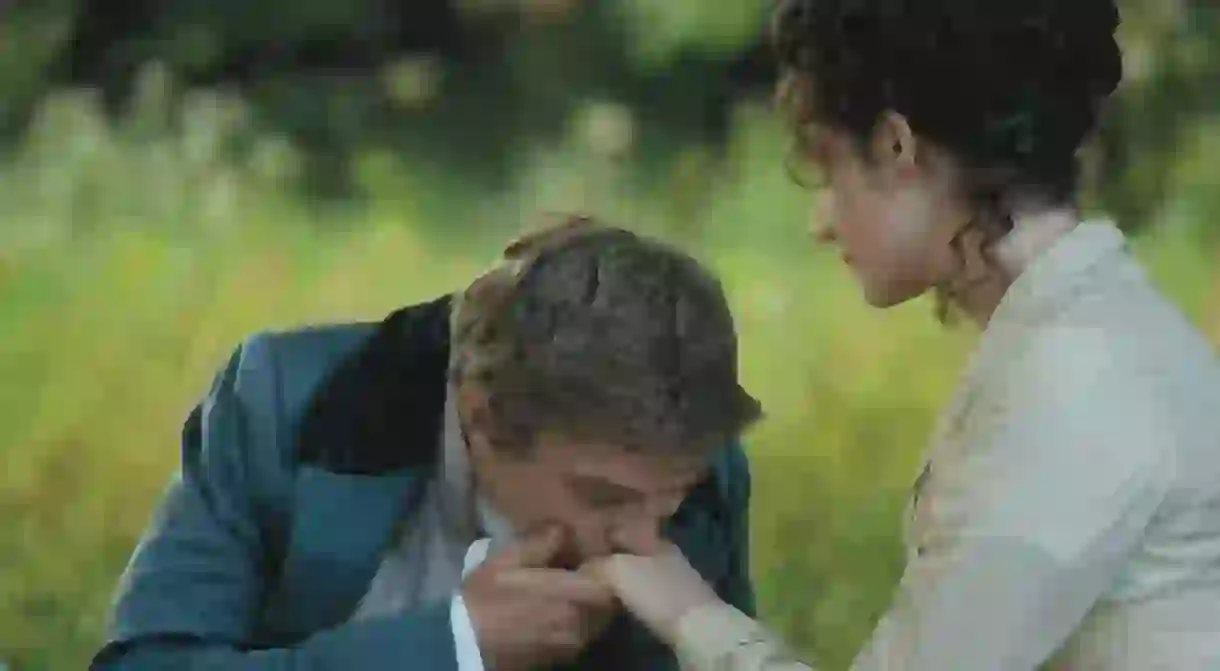If Only She Were More Like Emma Bovary

A hopeful young wife is undone by her naiveté in the masterful A Woman’s Life—but hope springs eternal.
A mostly sedate French period drama, A Woman’s Life twice delivers shocks with brilliant technical flourishes that fleetingly fracture the realist drama’s steady rhythm.
Jeanne Le Perthuis des Vauds (Judith Chemla), a newly married 19th century baroness, seeks her maid Rosalie (Nina Meurisse) in the night, but finds she isn’t in her room. She goes to her husband’s room to get his help. The film jump-cuts to the wife running blindly outdoors, the husband in pursuit. It’s obvious what humiliating spectacle traumatized Jeanne.

Later on, a montage of three static shots ushers Jeanne into a new reality. Having witnessed her husband returning from an early morning tryst with his latest mistress, she seeks the counsel of her priest, Abbé Tolbiac (Father François-Xavier Ledoux), who tries to guilt her into reporting the affair to the wronged husband.
Unwilling to be the cause of a tragedy, Jeanne twice denies the priest his bloodsport. The truth comes out anyway. The horrific montage makes a calculated anachronistic leap to modern CSI photographs. The aftermath of a crime of passion and the events that caused it are sickening whatever the age.
A Woman’s Life was adapted by its director Stéphane Brizé and co-writer Florence Vignon from Guy de Maupassant’s 1883 debut novel, A Life: The Humble Truth. Unfolding between 1820 and 1850 in tranquil rural and seaside settings worthy of Corot or Monet, it was photographed by Antoine Héberlé in the boxy Academy ratio, which has the effect of emphasizing body language. It helps to render A Woman’s Life painfully tense.
The film depicts Jeanne’s experience as a romantic young woman quickly disillusioned by her marriage to a domineering, penny-pinching philanderer. Raised in seclusion by her good-natured but overly protective parents (Jean-Pierre Darroussin, Yolande Moreau), Jeanne had conceived a princess’s future for herself—one that didn’t allow for sexual betrayal by her beloved husband, the handsome Viscount Julien de Lamare (Swann Arlaud), with the two women she trusted the most.

At 20, Jeanne is a merry, sweet-tempered innocent who has returned to her family’s chateau after completing her convent education. At 47, she is an embittered paranoid dwelling in near poverty with Rosalie, who loved her mistress despite betraying her, and still loves her. The film is not unrelentingly grim. Jeanne’s prayers are scarcely answered, but hope—a reason to go on living—eventually arrives in a tiny package.
Hope similarly surfaced in Brizé’s previous film, The Measure of a Man (2015), a contemporary realist film about a cash-strapped blue collar worker who sacrifices his new job as a big-box store security guard rather than collude in management’s underhand downsizing practices.
Mindful of her parents’ feelings and their social standing, Jeanne suffers passively, in masochistic silence, through the early years of her soul-destroying marriage. Maupassant’s novel was greatly influenced by his mentor Gustave Flaubert’s Madame Bovary (1856). Some viewers will yearn—not without justification—for Jeanne to take Emma’s adulterous route to self-liberation, which is what Jeanne’s countess friend Gilberte (Clotilde Hesme) does with disastrous consequences.
Yet Jeanne is much closer in spirit to the long-suffering heroine of Anne Brontë’s 1844 The Tenant of Wildfell Hall than she is to either Emma or Gilberte. Not every sensual, beautiful, and frustrated young wife, suggests Maupassant, has the desire or wherewithal to take a lover.

Brizé and Vignon’s adaptation abandons Maupassant’s third-person narration and linear structure. Adopting Jeanne’s perspective, the film interrupts the flow of her consciousness through cuts, so that her memories buffet her thoughts in the present. Contemplating Julien’s adulteries or reading the begging letters sent by their wastrel son Paul (Finnegan Oldfield), for example, Jeanne recalls happier times with each.
In making a mosaic of her impressions, A Woman’s Life recalls many of Dennis Potter’s television dramas with their daydreaming protagonists, and the films of Alain Resnais and especially Nicolas Roeg. Like Brizé, Roeg favored abrupt cuts to the present and the future, whether lived or imagined.
In changing Maupassant’s title from “a life” to “a woman’s life,” Brizé has given a feminist emphasis to a tale of a blameless girl trapped into a marriage of convenience, as her mother had been before her. The extended closeup that shows the anguished Jeanne being deflowered by Julien her on their wedding night sets the tone for her victimhood.
Chemla is radiant as the young Jeanne, dark and drawn—almost wraith-like—as Jeanne in middle age. The actor makes the transition seamlessly. She also gives a heartbreaking performance that makes us want to spirit Jeanne away to a place of comfort and safety.
A Woman’s Life opens in the United States on May 5, 2017.













